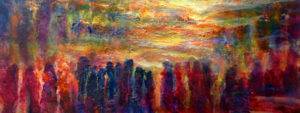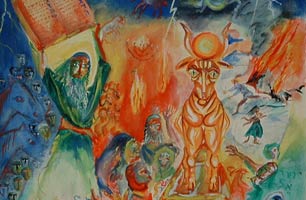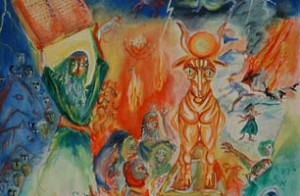
Parashah Shelach helps me understand a fundamental part of the human condition giving perspective into the fickle nature of the Israelite people’s relationship to their God as the Almighty leads them from bondage to the Promised Land. Put simply, the people lack trust. Not just in God, but more fundamentally in themselves. The text asks if I am unable to trust in myself, how can I be in a relationship with anyone else including even God?
The Almighty has been steadfast as a protector and provider, out of Egypt, across the Red Sea and to Sinai. Yet, at every turn, the people complain, unable to place their trust in God. In Parashah Shelach, God asks the people to send a reconnaissance team into the land that God has promised. The scouts return with more than information about the people and the land; the scouts conclude that they are like giants and we are like grasshoppers. They are of greater Middot[1] than we. Any attempt to conquer the land is doomed, even though this was the Land that God had promised. I was perplexed baffled by this lack of trust in God until I realized that in actuality, this was fundamentally a lack of trust in themselves, making it impossible to trust in God.
This insight remains as true today as it was then. Only when we are able to trust in ourselves can we then trust in another. Trust is the capacity to open ourselves to a deeper sharing, creating a more profound relationship. But this also requires becoming vulnerable to someone else. Our lack of trust, or fear of what bad might happen, is overcome by the hope of what good could be by establishing bonds of trust.
We so often build emotional walls around us. We believe the walls are meant to protect us. But in fact, these walls shut us off, creating a spiritual and emotional prison that keeps us from others as surely as they shut others out. But our greatest joy comes when we are in a relationship with others, when we can trust in ourselves enough to entrust others with the most intimate parts of who we are. Although it is scary to admit our fears, it is also empowering; for it opens us up to the possibilities of the heart.
This trust and openness is not a place of weakness; it takes a strong person who is able to show vulnerability. To show someone else, a spouse or a child, that you need them and their help requires inner strength and courage. It reinforces and deepens the relationship bringing you closer than before. Together you can face what certainly would have been a lonely battle by yourself. This becomes a message of hope.
The meaning of Shelach is ultimately this message of hope, which might seem counterintuitive. The older people are consigned to die in the desert so that the next generation is properly prepared to enter the Land. But it is this older generation who are the teachers of the generation that will enter the Promised Land. Even though they suffer the consequences of mistrust, the rest of the Torah shows them grapple with this important lesson and strive to teach their children well.
_________________________________
[1] The term Middot, in Numbers 13:32, has been translated to mean size or stature. However, in the context of Mussar, Middot also means measure, character, or values. The Torah might have this broader understanding of this word, strengthening the argument posited in this essay.


